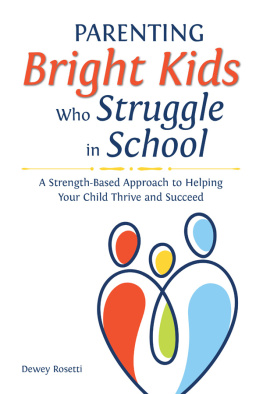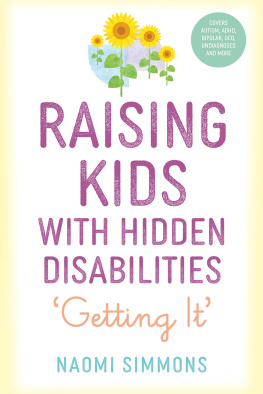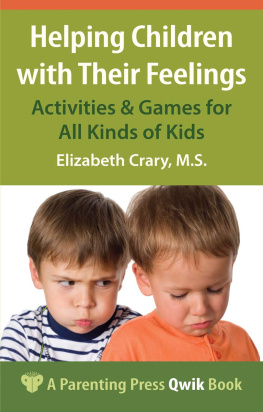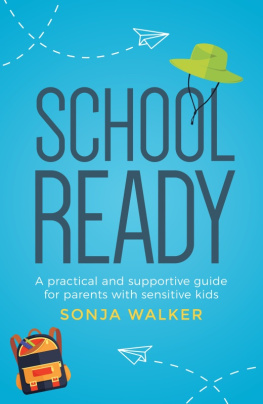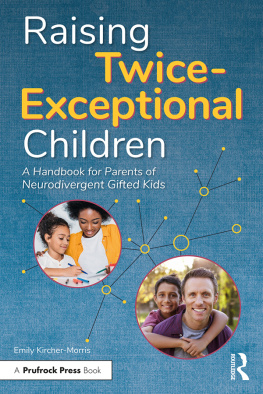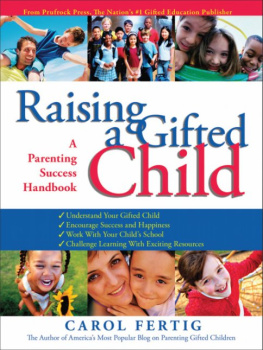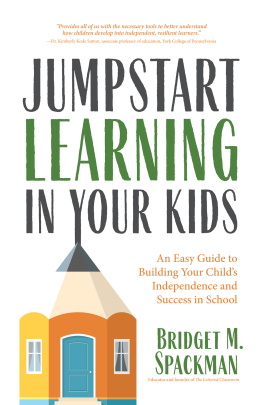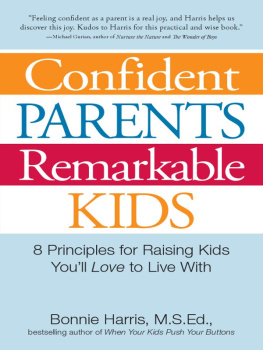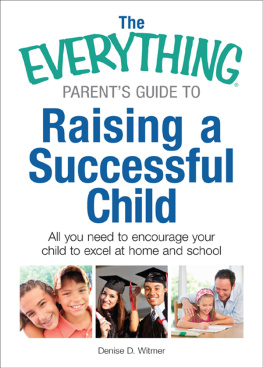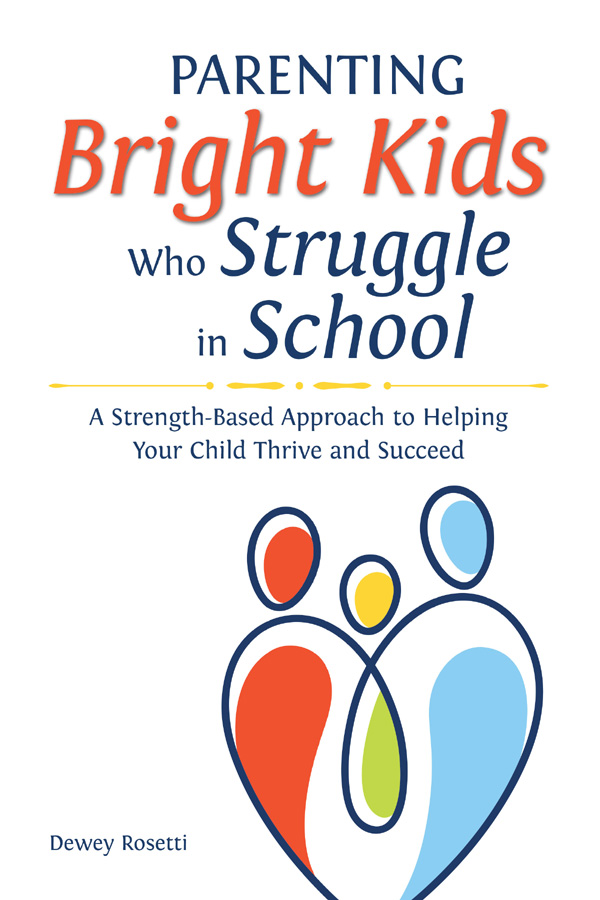


Library of Congress information
on file with the publisher.
Copyright 2020, Prufrock Press Inc.
Edited by Stephanie McCauley
Cover and layout design by Allegra Denbo
ePub ISBN: 978-1-64632-035-6
No part of this book may be reproduced, translated, stored in a retrieval system, or transmitted, in any form or by any means, electronic, mechanical, photocopying, microfilming, recording, or otherwise, without written permission from the publisher.
For more information about our copyright policy or to request reprint permissions, visit https://www.prufrock.com/permissions.aspx.
At the time of this books publication, all facts and figures cited are the most current available. All telephone numbers, addresses, and website URLs are accurate and active. All publications, organizations, websites, and other resources exist as described in the book, and all have been verified. The author and Prufrock Press Inc. make no warranty or guarantee concerning the information and materials given out by organizations or content found at websites, and we are not responsible for any changes that occur after this books publication. If you find an error, please contact Prufrock Press Inc.

| Prufrock Press Inc.
P.O. Box 8813
Waco, TX 76714-8813
Phone: (800) 998-2208
Fax: (800) 240-0333
http://www.prufrock.com |
Dedication
To my wonderful daughters and my sainted husband, who encouraged me to finish what I started. We did it!
Table of Contents
Foreword
by Todd Rose
Introduction
A Childs Cry for Help
Acknowledgments
Thank you to the following people:
My sister Maureen Bruce, who attended all of those early Parents Education Network (PEN) events and presented me with a mock-up book prototype in 2005, my name on the cover as the author. Its inspiration became a burden of guilt as the years ticked by with no published title. Finally, I can say thank you.
My sister, Kathleen Sweazey, who generously supported me with her time, ideas, and donations from that first meeting in 2002.
Todd Rose, a friend and mentor, and most of all a teacher who has shared most generously his time and thinking to help me create a viable tool for parents. Without him, this book would not exist.
James Hider, a journalist who enthusiastically took what I had written and made it into a marketable draft while also serving as chief encourager and cheerleader.
Megan Malone, for her original writing.
Robin Schader, a colleague who introduced me to Prufrock Press and my editor, Stephanie McCauley.
All of the wonderful people I have met through PEN, starting with Rosalie Whitlock, our original advisor, nonstop cheerleader, and now preserver of EdRev through Childrens Health Council. PEN Board members and PEN advisors, you know who you are, who generously gave your time, advice, experience, and credibility to our original parent group as we searched for ways to support PEN members. PENs student group SAFE, whose members spoke respectfully and eloquently about their educational experiences. The parents and kids who agreed to be in case studies.
Natalie OByrne, my mentor who has brought me along over 25 years from a fixed to a growth mindset in so many aspects of my life.
Foreword
When parents hear from a teacher that their child is struggling in the classroom, their first thought is usually, Whats wrong? They can feel as though their world has been shaken because the assumption is that there must be something wrong with their child.
If this happens to you, you will likely find that your whole concept of parenting is suddenly under fire: Your child may be labeled as being different from other kids, and you will find yourself in an unfamiliar new world. It is not unusual to feel paralyzed by the experience as you struggle to understand your childs needs and potential, and even where your child will fit in school, future employment, and society.
Parenting Bright Kids Who Struggle in School is designed to serve as the first port of call to this unfamiliar landscape, and Dewey Rosetti is your ideal guide. She knows what you are going through because she experienced it herself. With her own daughter failing at school, Dewey spent years educating herself about the limits of one-size-fits-all education in order to ensure that her daughter received the schooling she deserved. But Dewey didnt stop there; wanting to share her hard-won knowledge, she launched a nonprofit to help parents and teachers understand what bright and often-misunderstood kids need to thrive. It was in this context that we came to know each other.
My own work is in a field called the Science of Individuality. This science rejects the idea of an average person and focuses on understanding the uniqueness of individuals. What we have found from this science is truly remarkable: We know that individuality is the rule, not the exception, that all people differ in meaningful ways in terms of learning and development, and that forcing a cookie-cutter approach, whether in medicine or education, both harms individuals and is counterproductive for society. The insights from this science made possible efforts to personalize everything from medicine to education.
Even though many people have benefited from the insights of the Science of Individuality, most parents probably havent heard of it. This is, in part, because there has not been a credible effort to translate its vital lessons into actionable insights for parents.
That is where Dewey steps in. After 25 years of self-education about the field of learning sciences and the various ways that different children approach learning, her perspective evolved from blaming the square peg child to identifying the serious faults in our outdated education system with its one-size-fits-all approach. She has taken the lessons of individuality, as well as important works of leading educators, psychologists, and neuroscientists, and communicated them in an accessible way for stressed parents to understand how they can start helping their child right now.
Deweys story of her own experience battling the standardized education system shows that it is possible for parents to move beyond their initial paralysis and discover a whole new way of supporting their child, one that builds upon their childs strengths and mitigates weaknesses. This is a method that can apply to any child, no matter their starting point. You just have to look at the success stories featured in the latter chapters of this book to understand how a wide range of kids who might otherwise have been written off by an overburdened and underfunded educational system can be nurtured into successful young adults.
I am in awe of Deweys journey and her contributions: from a passionate parent focused on solving the problems facing her little girl, to a social entrepreneur who helped thousands of kids and parents in her state, to a national leader bringing these ideas to all parents to help them support all children in realizing their full potential regardless of who they are or where they are starting their journey. She is nothing less than inspiring, and I cannot think of a more trustworthy person to take worried parents by the hand and lead them on this new path.
Next page
